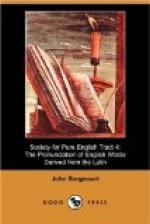In Chaucer’s time, the other nations of Europe, no less than England, pronounced Latin after the fashion of their own vernaculars. When, subsequently, the phonetic values of the letters in the vernacular gradually changed, the Latin pronunciation altered likewise. Hence, in the end, the pronunciation of Latin has become different in different countries. A scholar born in Italy has great difficulty in following a Frenchman speaking Latin. He has greater difficulty in understanding an Englishman’s Latin, because in English the changes in the sounds of the letters have been greater than in any other language. Every vowel-letter has several sounds, and the normal long sound of every vowel-letter has no resemblance whatever to its normal short sound. As in England the pronunciation of Latin developed insensibly along with that of the native tongue, it eventually became so peculiar that by comparison the ‘continental pronunciation’ may be regarded as uniform.
It is sometimes imagined that the modern English way of pronouncing Latin was a deliberate invention of the Protestant reformers. For this view there is no foundation in fact. It may be conceded that English ecclesiastics and scholars who had frequent occasion to converse in Latin with Italians would learn to pronounce it in the Italian way; and no doubt the Reformation must have operated to arrest the growing tendency to the Italianization of English Latin. But there is no evidence that before the Reformation the un-English pronunciation was taught in the schools. The grammar-school pronunciation of the early nineteenth century was the lineal descendant of the grammar-school pronunciation of the fourteenth century.
This traditional system of pronunciation is now rapidly becoming obsolete, and for very good reasons. But it is the basis of the pronunciation of the many classical derivatives in English; and therefore it is highly important that we should understand precisely what it was before it began to be sophisticated (as in our own early days) by sporadic and inconsistent attempts to restore the classical quantities. In the following paper Mr. Sargeaunt describes, with a minuteness not before attempted, the genuine English tradition of Latin pronunciation, and points out its significance as a factor in the development of modern English.
H.B.]
* * * * *
It seems not to be generally known that there is a real principle in the English pronunciation of words borrowed from Latin and Greek, whether directly or through French. In this matter the very knowledge of classical Latin, of its stresses and its quantities, still more perhaps an acquaintance with Greek, is apt to mislead. Some speakers seem to think that their scholarship will be doubted unless they say ‘doctr[’i]nal’ and ‘script[’u]ral’ and ‘cin[’e]ma’. The object of this paper is to show by setting forth the principles consciously or unconsciously followed by our ancestors




